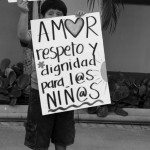ESCONDIDO – Today in San Diego federal court, the ACLU filed a lawsuit charging that the City of Escondido manufactured zoning and land use pretexts to discriminate against vulnerable children fleeing violence and persecution in Central America.
“This is what 21st Century discrimination looks like,” said David Loy, Legal Director for the ACLU of San Diego & Imperial Counties. “Whatever the personal beliefs of individual officials, the City of Escondido capitulated to discrimination and xenophobia and unlawfully denied a home to traumatized children.” The ACLU is joined in the lawsuit by Brancart & Brancart, Cooley LLP, and Lawyers’ Committee for Civil Rights Under Law.
In February 2014, Southwest Key Programs approached the City of Escondido about potential locations to house unaccompanied children pending placement with parents, relatives, or other caregivers while their immigration cases are pending. Southwest Key is the largest licensed provider of housing for such children in the United States.
As required by law, the federal government contracts with Southwest Key and other entities to provide housing for children fleeing from violence and persecution in countries such as El Salvador, Honduras, and Guatemala. Many of those children ultimately qualify for asylum or legal status allowing them to remain in the United States.
Southwest Key already successfully operates such housing facilities in San Diego County and elsewhere around the country. When, at the request of the Federal Government, Southwest Key sought to add a facility in San Diego County, it determined Escondido had the most suitable properties available. However, when it sought City approval, it ran into a firestorm of opposition led by Mayor Sam Abed. Southwest Key first sought to convert a motel site located in a commercial zone to housing for unaccompanied children. However, City staff rejected that proposal, despite the fact that the municipal code expressly allowed “residential care facilities” in that zone. Attempting to work with the City, Southwest Key agreed to suspend an appeal from that decision and pursued a conditional use permit to convert a former skilled nursing facility located in a residential zone in another part of the City.
But before the City’s Planning Commission held its hearing on the conditional use permit for the nursing home in June 2014, Mayor Abed publicly opposed the project, claiming it was a “federal” issue he didn’t want anywhere in Escondido. Members of the public complained about the project’s “GHETTOIZATION IMPACTS” on the “character of the neighborhood” and objected to the “undesirable taste” it would bring to the “demographic of our neighborhood.”
The Planning Commission then unanimously rejected the proposal. The rejection came despite a staff report documenting that Southwest Key would bring 90 new jobs and inject $6 or 7 million per year in new revenue into the community, would not impose any significant adverse impact on the community, and was enthusiastically recommended by the mayor of Youngtown, Arizona, where Southwest Key has a facility similar to that proposed for Escondido. And Southwest Key’s proposal was rejected despite the fact that the Commission had approved numerous applications to expand a skilled nursing facility that had previously occupied the same site. Soon afterward, the Planning Commission and City Council amended the Escondido zoning code to prohibit residential care facilities in the commercial zone where the motel sites are located.
After Southwest Key appealed the Planning Commission’s denial of a conditional use permit to the City Council, Mayor Abed spoke on national television against the project. He professed concern for the “70,000 Hispanic residents in our city,” but claimed that “to have more illegal immigrants to our city is a problem for the entire community,” despite undisputed evidence the unaccompanied children would be housed and cared for entirely at federal expense and would not attend local schools.
The City Council held a hearing on Southwest Key’s appeal in October 2014. Opposing the appeal, members of the public proclaimed, “WE DONT [sic] WANT THESE PEOPLE IN OUR NEIGHBORHOOD,” and reminded the City Council, “You are sitting up there right now because the majority of the people wanted you there, not the minority. Speak for the majority. They’re the ones that put you up there.” As one resident said, “I am very much against housing these illegals. I have a teenage daughter at home and do not feel safe with them roaming around the area. This is a nice neighborhood.”
Joseph Rich, Co-Director of the Fair Housing and Community Development Project at the Lawyers’ Committee for Civil Rights Under Law, said: “Such statements have been found by many courts to be coded language for unlawful animus and to support findings of discrimination that violate the Fair Housing Act and other civil rights laws.”
The City Council voted 4-1 to deny Southwest Key’s appeal, ignoring detailed evidence that demonstrated the economic benefits the project would confer on the City, as well as the absence of any legitimate concern about traffic, parking, noise, or public health. As Mayor Abed said in voting to deny the appeal, “half of our community is Hispanic,” and although he professed that “we are committed to help all of them regardless of their immigration background,” he concluded, “Now, do we need more? I don’t think so.”
The lawsuit charges the City of Escondido with depriving children from Central America of housing based on race, color, national origin, ancestry, immigration status, and/or hostility to federal policy, in violation of federal and state fair housing laws and the United States Constitution.
###

